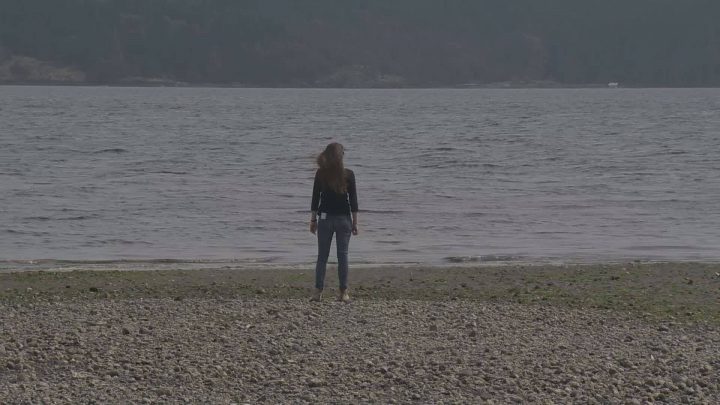Julia McElgunn and Dr. Shannon Waters couldn’t be further apart when it comes to where they stand on the Trans Mountain pipeline project.

READ MORE: When will the Trans Mountain pipeline expansion get built? It’s hard to tell
McElgunn, who lives in Calgary and has worked in the oil and gas industry for 20 years, is pro-pipeline. Waters, a Vancouver Island physician who is Coast Salish and a member of the Stz’uminus First Nation, is anti-pipeline. Their stances are unwavering, but remarkably, the two have become friends.
McElgunn said there is so much uncertainty in her industry right now with no clear line of sight forward — and she’s frustrated.
“I think we have been living in a bubble for too long and it’s been good for too long,” she said. “There hasn’t been a need to really be active in the communities, and in the country, and even globally, to talk about what our Canadian product can actually bring to the globe. So, we are now at a crucial point in history where we can’t get our product out. We are very landlocked.”
McElgunn said the past two years have marked a turning point.
“We are no longer a quiet industry that is sort of humming along,” she said.
“There’s a lot at stake right now that is going to either make or break the industry over the next few years, I think.”
She believes there are a lot of misconceptions about the reach of the industry.
“A lot of people have the misconception that if I don’t drive, I don’t use oil and gas, but it is part of our everyday lives. It is part of our medical industry, it’s part of our sunscreen and our sunglasses and our sports gear that we wear. It’s part of the clothing that you send your kids to school in, it’s part of the school supplies. It is in plastics, it is in cosmetics. It is in absolutely everything.”
READ MORE: Notley says Alberta will ‘hold Ottawa’s feet to the fire’ on Trans Mountain timeline

Get weekly money news
On the west coast, Dr. Shannon Waters is against the Trans Mountain pipeline expansion.
Waters, who lives on Vancouver Island, said we have come to an unprecedented time.
“We are having drastic changes going on around us: to our homes, to our lands, to the air we breathe and the water we drink,” she said. “It is now more important than ever to see we are interconnected to the environment and to each other. So, we are really going to need to pull on things such as strength, hope and resilience in the times ahead.”
Waters, who works as a public health physician said she draws on her Coast Salish and Stz’uminus First Nation background in her work.
“There’s an interconnectedness in all things, and how we care for the environment directly affects what the state of the environment is and directly affects our health.”
It has been a tough road for the Trans Mountain pipeline project and Canadians are getting frustrated on both sides of the debate.
Watch below: Global’s ongoing coverage of the Trans Mountain pipeline project
Politicians have been fighting, the courts are involved, anti-pipeline camps have been set up and torn down, Greenpeace blocked tanker traffic by rappelling on a Vancouver bridge in protest, and the somewhat silent oil-and-gas industry is now getting louder by hitting the streets in support of the pipeline.
But just when it seems hope for finding a middle ground is lost, McElgunn and Waters share their story. The two, by chance, signed up for the same online speaking course (SPEAK! Canada). Over the course of several weeks, they were somewhat forced into hearing each other out. They got to know each other, and became friends.
WATCH: Ottawa announces it won’t appeal Trans Mountain court decision, will re-do Indigenous consultations (Oct. 3)

Now they are an unlikely pair with a bigger message to share.
“I really got the chance to know her as a fellow human being, a fellow woman, and appreciate our similarities and find ways to just be in space with our differences,” Waters said.
McElgunn added both have a desire to create a better environment.
“Not just from a natural environment, but from a working environment, a community environment, a metro environment for all of Canada’s citizens,” she said.
Both have been watching the pipeline debate unfold and say the only path forward is together.
“I think through dialogue, through people we have differing views with–sometimes we can find our commonalities, form a relationship and maybe we might find some solutions that haven’t been thought of yet,” Waters said.
“In the end, we are one nation and we need to be able to come together and probably the best way we can come together is to sort of lay down our defences and show some vulnerability and be able to actively listen,” McElgunn said.
What that looks like on a national scale in a high-stakes, highly emotional battle over a multibillion-dollar pipeline project? No one knows… yet.
“We are going to need to draw on the innovativeness, the kindness, the ideas of everyone,” Waters said. “We are in this together.”















Comments
Want to discuss? Please read our Commenting Policy first.